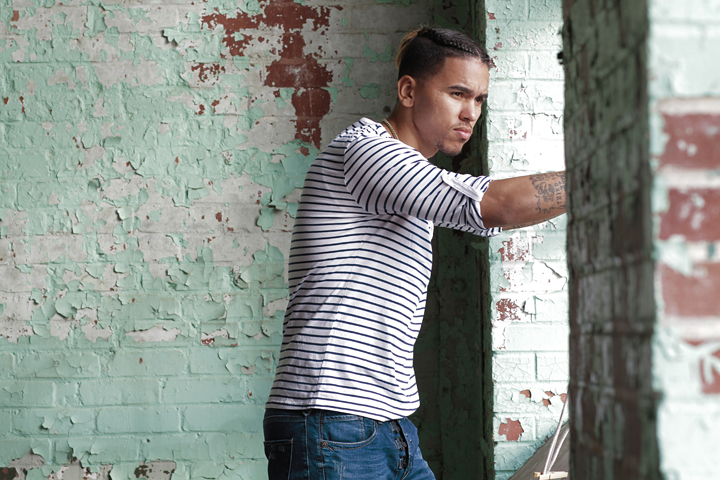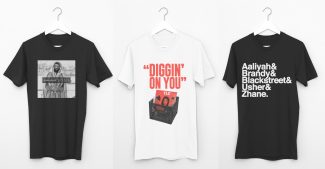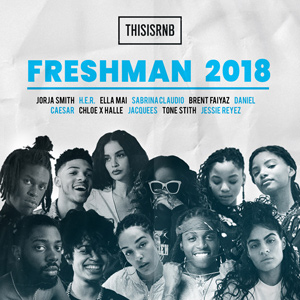
Adrian Marcel is back and better than ever.
The Oakland native finally released his long-awaited debut album ‘GMFU‘ last month, and it’s his most honest and authentic project yet. Known for his smooth vocals, honest lyrics, and charismatic personality, Adrian is set to write a new chapter in his life and music career.
In an exclusive interview, Marcel talks with ThisisRnB about where he’s been, why ‘GMFU‘ is so important to him, and how he plans on breaking down the walls between himself and his fans that make artists seem so inaccessible.
With a mentor in Raphael Saadiq, three successful mixtapes, and a hit single like “2AM,” under his belt, there’s no telling how far his career can and will go. Adrian Marcel is only out to be the best he can be, and in our discussion you’ll see that he’s more determined now to win than ever before.
Check out the interview below.
_____________________________________________________
THISISRNB: We have been covering your music on ThisisRnB for 4 years now and over the course of that time we’ve seen multiple projects. What can you tell us about who Adrian Marcel is today compared to when you released your first mixtape?
AM. When I dropped my first tape, I was fresh shit, very wet behind the ears. I was still learning a lot and excited about every little thing… and you know, very anxious. And I think at this point today coming from ‘7 Days of Weak,’ ‘Weak After Next,’ ‘Weak After Next: Reloaded,’ and the “2 AM” record, and now ‘GMFU,’ I’m very much more laid back. You know there’s not a lot that excites me anymore besides work…a grind. I’m just more confident in myself, more confident in my abilities. I’ve seen a lot more. I’ve experienced a lot more. I’ve traveled the world at this point with my music. I make a living off of my music at this point, now that people know who I am. So it’s a definite growth, in that I’m more mature in my music and the way that I move and everything I feel now.
Last time you spoke with us, you were working on ‘GMFU’ as your debut album on Republic Records, but we noticed that you released it independently. So can you lead us through the process of why you decided to drop the album independently?
Well, you know I signed with Republic in 2012, and we did a lot of good work in my opinion. And I just think that the visions just started to get mixed up, the direction got lost. In a lot of ways I feel like I lost myself, and the direction and vision I had. We had always been working on music and ‘GMFU’ was always the plan for the debut album even before we got with Republic. And just through the process there was so many blocks and different opinions about what we should be doing, the type of sound it should be so it became a conflict with that. We all decided that it was best that we parted ways, so we separated and were able to leave with a handshake and good spirits.
It all worked out for me really, because it allowed me to tap back into the sound I lost like with ‘7 Days of Weak’ and some of ‘Weak after Next.’ The real Oakland in me, I think sat aside and I shouldn’t have. That’s really where the title came from ‘Got Me Fucked Up.’ It’s really “Got Myself Fucked Up” because we get distracted and thrown off but at this point now, I’m more focused than I’ve ever been. I feel I’m more on the right track to be for Adrian. It was just best that it happened that way for me. Independently it’s a lot harder, but in the end you get a greater reward to have the full control of your creativity.
Since you left Republic were you able to keep any of the music you recorded under that deal, or did you have to start brand new?
Well like I said, we worked on so much music before we got with Republic, so it was just in the safe. We had songs in the safe that we knew we weren’t just going to let go of freely, and just throw out there. We wanted to make sure that we had a platform that would make sense before we released them. And some of them we had teased since 2013 and we had some things online, but for the most part anything that we recorded with them [Republic], we had to go ahead and accept that. We weren’t trying to go through the struggles of trying to clear things and back and forth, whatever. Whatever’s yours is yours, it’s all good.
I look at myself as a creative, I don’t feel like that’s going anywhere anytime soon, god forbid. But making music, and writing, and creating is what I love doing and what I feel that I do best. It was never a stressful moment in that aspect, so when it came down to parting ways, yes we had to definitely go out and lock in a new sound, something I felt that was still hip and in the times, but not trendy per se and still Adrian Marcel. Still falling back into the ‘7 Days of Weak’ sound, but re-vamping it. So it wasn’t a hard process at all, I feel like it was worth it. I needed to have a challenge for myself.
We know that you’ve been working with Raphael Saadiq since you’ve been introduced to us, and at this point in your career how much influence does he have on your music and your creative process?
Well Raphael is big bro. He’s like family at this point and has always had 100% mentorship in all of my projects. But I think this one, ‘GMFU’ in particular is special because Ray and I have never really sat in the studio and started from scratch. It’s always been I bring him a sound or I bring him the music and he kinda leads me and helps me to polish it. For this one we sat down and locked in, and was like, “Yo, let’s pick up the pace, and let’s really tap in and help me to know that real process that it takes to be a true artist.” Not that I haven’t been that way, but I felt that I needed to go to a new level.
Again [we had to do that] because of leaving Republic, having a new beginning and starting over. He really stepped in and gave me so much guidance on how to create a genuine project, an album, a body of work that he [Raphael Saadiq] feels like my fans would appreciate. He would always tell me, “Yeah you know you got your “2 AM” fans, but you got a lot of ‘7 Days of Weak’, ‘Weak After Next’ fans too that are still hungry and waiting.” He was really that voice among others that were being listened to that said, “Don’t lose yourself and don’t lose what you do naturally. And be confident in that.” Ray has always given me the confidence to believe in myself. So I think at this point in this process, the last year and a half of working on this album, he did a great job of actually stamping that and instilling that in me.
Your album ‘GMFU’ stays pretty consistent with past projects you’ve put out with themes of love, sex, break-ups, etc. and it runs deep with 16 tracks. So tell us about the initial concept for the album and when you knew you had exactly what you wanted, to convey that message?
The title ‘Got Me Fucked Up’ is a very aggressive sounding title, a broad statement… but I like to think of it as “Got Myself Fucked Up.” I wanted to make this album very personal to me. A lot of my music is [personal]. My music has always been honest and it’s always been stories that either I went through or someone very close to me has been through. This one [‘GMFU’] is just more personal than all the rest. It’s more of a current situation. This is what’s happening. This is what has been happening. These are things that I have conflicts with. These are the things that I feel. At first a lot of the songs were driven towards others and just outside entities. Then we were like, nah. I needed to hone in and bring it back to self. You know, what is Adrian going through? What does Adrian want? Where is Adrian headed? Where has Adrian been? It was just very, very extremely personal.
And even the way we formed all the music from number 1 to number 16. Number 16 being, to me, the most personal song on the record and leaving the album with a question. What the fuck am I doing? What’s next. You know we all have this thing where we all feel like we have to have it all figured out. And you know, I don’t. I’m kinda finding my groove back and finding my lane again. It’s still that anxiety of what’s next. What am I going to do? What am I about to do? So again, the album was geared towards me instead of it being geared towards concepts. Once we figured out that we had to get it back to self, creating the album got easier as we recorded and wrote because it was current. It just happened as “let’s talk about this.” “Let’s disguise this as this situation but metaphorically this is exactly what I’m going through.” It was a way for all those fans of mine, and those supporters of mine that have been waiting for new music and wondering where I’ve been, to get caught up.
Continue interview on next page.




